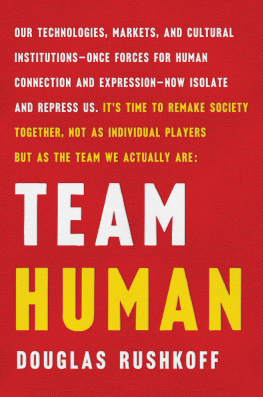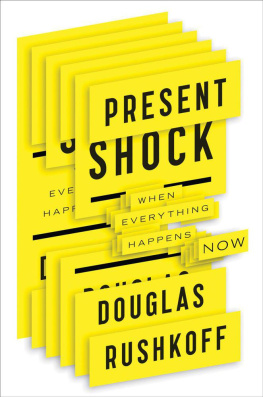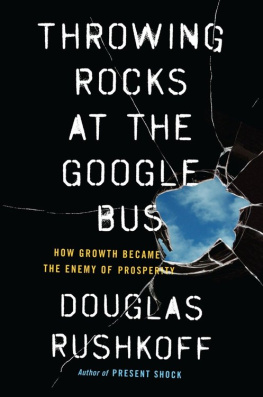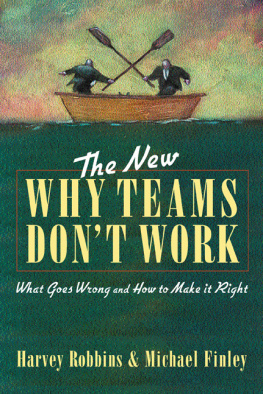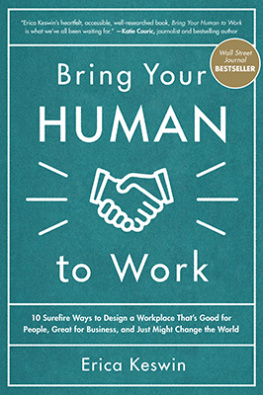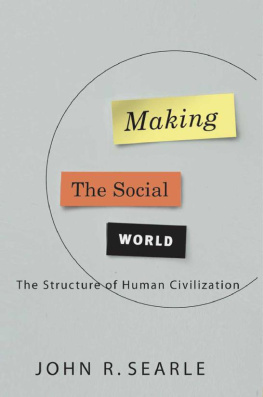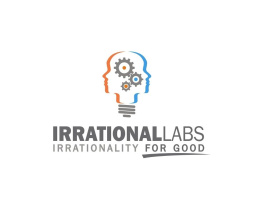Contents

ALSO BY DOUGLAS RUSHKOFF
Throwing Rocks at the Google Bus: How Growth Became the Enemy of Prosperity
Present Shock: When Everything Happens Now
Program or Be Programmed: Ten Commands for a Digital Age
Life, Inc.: How the World Became a Corporation and How to Take It Back
ScreenAgers: Lessons in Chaos from Digital Kids
Get Back in the Box: Innovation from the Inside Out
Nothing Sacred: The Truth About Judaism
Coercion: Why We Listen to What They Say
Playing the Future: What We Can Learn from Digital Kids
Media Virus: Hidden Agendas in Popular Culture
Cyberia: Life in the Trenches of Cyberspace
TEAM
HUMAN
Douglas Rushkoff

W. W. NORTON & COMPANY
Independent Publishers Since 1923
New York London
Copyright 2019 by Douglas Rushkoff
All rights reserved
First Edition
For information about permission to reproduce selections from this book,
write to Permissions, W. W. Norton & Company, Inc.,
500 Fifth Avenue, New York, NY 10110
For information about special discounts for bulk purchases, please contact
W. W. Norton Special Sales at specialsales@wwnorton.com or 800-233-4830
Book design by Lovedog Studio
Production manager: Beth Steidle
The Library of Congress has cataloged the printed edition as follows:
ISBN 978-0-393-65169-0
ISBN 978-0-393-65170-6 (ebk.)
W. W. Norton & Company, Inc., 500 Fifth Avenue, New York, N.Y. 10110
www.wwnorton.com
W. W. Norton & Company Ltd., 15 Carlisle Street, London W1D 3BS
CONTENTS
Find the Others...
Autonomous technologies, runaway markets, and weaponized media seem to have overturned civil society, paralyzing our ability to think constructively, connect meaningfully, or act purposefully. It feels as if civilization itself were on the brink, and that we lack the collective willpower and coordination necessary to address issues of vital importance to the very survival of our species.
It doesnt have to be this way.
Everyone is asking how we got here, as if this were a random slide toward collective incoherence and disempowerment. It is not. Theres a reason for our current predicament: an antihuman agenda embedded in our technology, our markets, and our major cultural institutions, from education and religion to civics and media. It has turned them from forces for human connection and expression into ones of isolation and repression.
By unearthing this agenda, we render ourselves capable of transcending its paralyzing effects, reconnecting to one another, and remaking society toward human ends rather than the end of humans.
The first step toward reversing our predicament is to recognize that being human is a team sport. We cannot be fully human alone. Anything that brings us together fosters our humanity. Likewise, anything that separates us makes us less human, and less able to exercise our individual or collective will.
We use our social connections to orient ourselves, to ensure mutual survival, and to derive meaning and purpose. This is not merely a quaint notion but our biological legacy. People who are disconnected from the organizations or communities they serve often wither without them.
We sometimes connect with one another in order to achieve some common goal, such as finding food or evading prey. But we also commune and communicate for their own sakebecause we gain strength, pleasure, and purpose as we develop rapport. Are you there? Yes, I hear you.
You are not alone.
We have amplified and extended our natural ability to connect by inventing various forms of media. Even a one-way medium, such as a book, creates a new intimacy as it lets us see the world through another persons eyes. Television enables us to bear witness to what is happening to people across the globe, and to do so en masse. On TV we watched together, simultaneously, events from the moon landing to the felling of the Berlin Wall, and experienced our collective humanity as never before.
Likewise, the internet connects us more deliberately and, in some ways, more reassuringly than any medium before it. With its development, the tyranny of top-down broadcast media seemed to be broken by the peer-to-peer connections and free expressions of every human node on the network. The net turned media back into a collective, participatory, and social landscape.
But, as seemingly happens to each and every new medium, the net went from being a social platform to an isolating one. Instead of forging new relationships between people, our digital technologies came to replace them with something else.
We live with a bounty of communications technologies at our disposal. Our culture is composed more of mediated experiences than of directly lived ones. Yet we are also more alone and atomized than ever before. Our most advanced technologies are not enhancing our connectivity, but thwarting it. They are replacing and devaluing our humanity, andin many different waysundermining our respect for one another and ourselves. Sadly, this has been by design. But thats also why it can be reversed.
We are embedding some very old and disparaging notions about human beings and their place in the natural order into our future technological infrastructure. Engineers at our leading tech firms and universities tend to see human beings as the problem and technology as the solution.
When they are not developing interfaces to control us, they are building intelligences to replace us. Any of these technologies could be steered toward extending our human capabilities and collective power. Instead, they are deployed in concert with the demands of a marketplace, political sphere, and power structure that depend on human isolation and predictability in order to operate.
Social control is based on thwarting social contact and exploiting the resulting disorientation and despair. Human beings evolved by gaining the capacity to forge greater numbers of social connections. The development of our brain, language, text, electronic media, and digital networks were all driven by our need for higher levels of social organization. The netjust the latest of these advanceschallenges us with the possibility that thinking and memory may not be personal at all, but group activities. But this potential has been overshadowed by deep suspicion of how human beings might behave as an empowered collective, as well as a growing awareness that socially fulfilled people need less money, experience less shame, behave less predictably, and act more autonomously.
Thinking, feeling, connected people undermine the institutions that would control them. They always have. Thats why new mechanisms for forging bonds and cooperation between people are almost inevitably turned against those ends. Language that could inform is instead used to lie. Money that could promote trade is instead hoarded by the wealthy. Education that could expand workers minds is instead used to make them more efficient human resources.
All along the way, cynical views of humans as a mindless mob, incapable of behaving intelligently and peacefully, are used to justify keeping us apart and denying us roles as autonomous actors in any of these areas of life. Our institutions and technologies arent designed to extend our human nature, but to mitigate or repress it.
Once our humanity is seen as a liability instead of a strength, the corresponding cultural drive and spiritual quest is to transcend our personhood: a journey out of body, away from our humanness, beyond matter, and into whatever substratebe it ether, electrical wavelengths, virtual reality, or AIwe fetishize at that moment.

